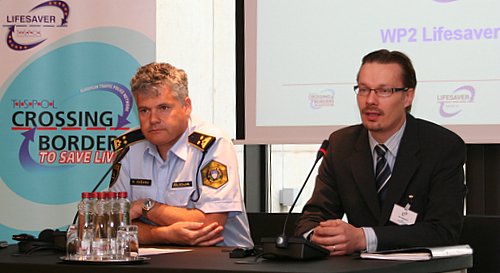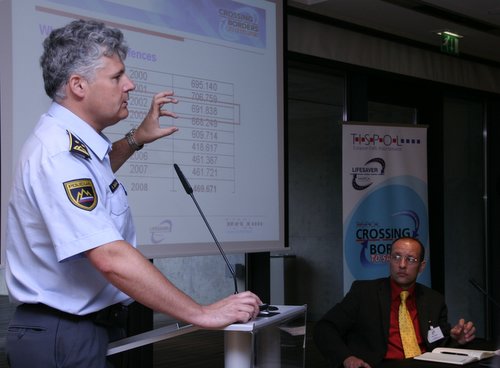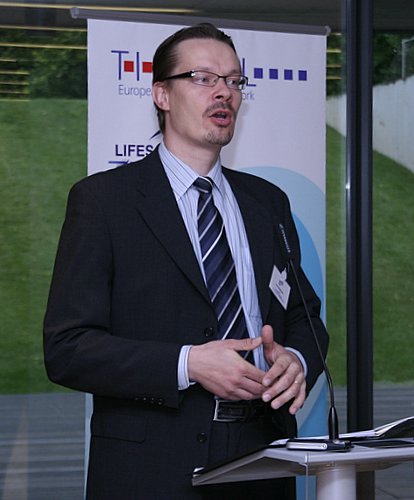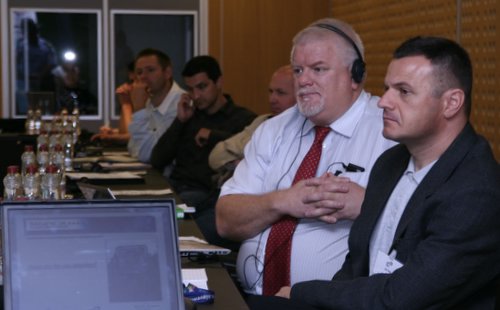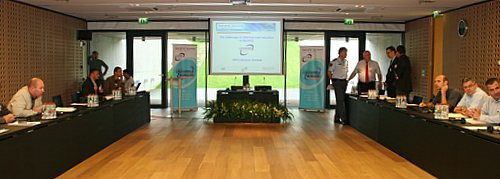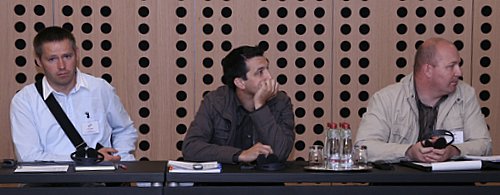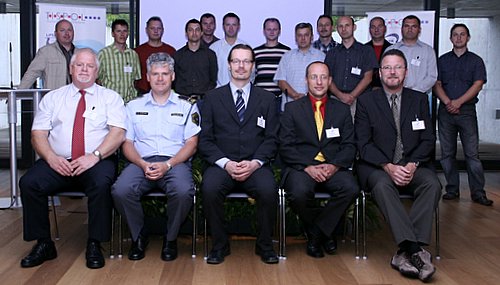Today, 24 June 2009, sees the conclusion of a two-day international seminar on road traffic safety, which has been held at Brdo pri Kranju and organised for the third consecutive time in Slovenia by the European Traffic Police Network - TISPOL as part of the Lifesaver project. Beside Slovenian police officers, the seminar is attended by European road traffic experts.
From left to right: the host of the conference, former head of the Traffic Police Section at the General Police Directorate, Robert Sušanj, and TISPOL representative Pasi Kemppainen from the Finnish traffic police. They presented the Lifesaver project and other TISPOL projects aimed at improving road traffic safety in Europe.
While the seminars in December 2008 and February 2009 were organised at the management level for officers in strategic positions in the competent institutions, this time the international seminar is primarily intended for "operatives".
This is why it is being attended, apart from guests from abroad, by all traffic police stations' commanders and assistant commanders (there is one traffic police station in every police directorate in Slovenia). The participants see it as an opportunity to acquaint themselves directly with practices and strategies used in other countries in this sphere while being able to present their own good solutions and approaches in road traffic control.
Robert Sušanj, the representative of the Slovenian police, opened by outlining the road traffic safety situation in Slovenia. Despite the fact that in the last decade, i.e. since 1995, the number of fatalities in road traffic accidents has been substantially reduced, the present number of fatalities is still too high as compared to the European average. "In 2008 there were 214 fatalities in road traffic accidents, representing 107 fatalities per million inhabitants, which is a very high number compared to that in Finland, for instance, which averages 60 fatalities per million inhabitants." The photograph also shows the facilitator of the seminar, Rafael Viltužnik, Assistant Director of the Police Directorate Maribor, who has long-standing experience in the sphere of road traffic safety
In their papers and discussions the participants are addressing various issues, such as the key challenges relating to the reduction of road traffic accidents, the use of new technologies in ensuring road traffic safety, the most frequent factors involved in the occurrence of road traffic accidents, the problems associated with driving under the influence of drugs, the methods and equipment involved in the solving of the problem of speeding, and others.
In yesterday's discussion the participants agreed that all the measures so far taken to ensure road traffic safety will have to be further upgraded, while in the future, in addition to continued control of violations of road traffic regulations such as speeding, drunk driving and the use of safety belt, greater attention will have to be placed on other violations, which, even though they may not be so urgent, constitute mass violations (e.g. the use of mobile phones and running a red light).
TISPOL representative Pasi Kemppainen emphasised the significance of joint European actions and a week-long stringent controls of violators throughout Europe: "Imagine a situation where, as part of a week-long action on the European roads, thousands of police officers do the same thing - control, for instance, commercial vehicle drivers. This substantially increases the probability that such drivers will be stopped, which makes such actions very effective. The psycho-physical condition of over a million drivers was thus checked within a single week of all-European stricter control that was carried out in late 2008 and covered 24 European countries."
The aim of the Lifesaver project, which was launched in 2008, is to reduce the number of deaths in road traffic accidents on Europe's roads. To attain this goal, European traffic police forces have undertaken joint action under TISPOL leadership at the strategic, tactical and operative level.
To address the problems of speed, alcohol and drugs, as well as problems related to bus and commercial traffic and the use of safety belts, European traffic police forces will cooperate in 27 stricter joint controls over three years.
From right to left: Jože Šmid from the Traffic Police Section at the General Police Directorate and Roger Brooks from the United Kingdom, a member of TISPOL operational group, which has 27 members (one from each EU Member State) and is in charge of coordinating the Lifesaver project.
With a view to directing and coordinating work in the sphere of road safety more effectively, more various international conferences and thematic seminars will be organised. In addition to that, traffic officers will continue to have working visits and exchanges of good practice while a specialist manual will be prepared for police officers. While most of the seminars will take place in six TISPOL member states: Hungary, Poland, Portugal, Romania, Spain and Slovenia, TISPOL will provide both the preparation of the seminars and the funding of the whole project.


